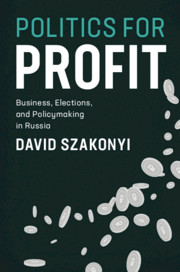Book contents
- Frontmatter
- Dedication
- Contents
- List of Figures
- List of Tables
- Acknowledgments
- Introduction
- 1 A Theory of Businessperson Candidacy
- 2 Identifying Businesspeople Who Run for Office
- 3 Economic Competition, Weak Parties, and Businessperson Candidacy
- 4 Choosing Ballots, Parties, and Delegates
- 5 Firm-Level Returns from Businessperson Candidacy
- 6 Businesspeople as Policymakers
- 7 Conclusion and Policy Recommendations
- Appendix
- Bibliography
- Index
- Series Page
6 - Businesspeople as Policymakers
Published online by Cambridge University Press: 15 June 2020
- Frontmatter
- Dedication
- Contents
- List of Figures
- List of Tables
- Acknowledgments
- Introduction
- 1 A Theory of Businessperson Candidacy
- 2 Identifying Businesspeople Who Run for Office
- 3 Economic Competition, Weak Parties, and Businessperson Candidacy
- 4 Choosing Ballots, Parties, and Delegates
- 5 Firm-Level Returns from Businessperson Candidacy
- 6 Businesspeople as Policymakers
- 7 Conclusion and Policy Recommendations
- Appendix
- Bibliography
- Index
- Series Page
Summary
This chapter investigates whether businessperson politicians actually govern differently. I argue that given their preferences and managerial expertise, businesspeople in office may adopt policies favorable to the business community and improve government efficiency. To test these claims, I collect data on over 33,000 Russian mayors and legislators and investigate policy outcomes using detailed municipal budgets and over a million procurement contracts. Using a regression discontinuity design, the results show that businessperson politicians increase expenditures on roads and transport, while leaving health and education spending untouched. Prioritizing economic over social infrastructure brings immediate benefits to firms, while holding back long-term accumulation of human capital. However, businesspeople do not reduce budget deficits, but rather adopt less competitive methods for selecting contractors, particularly in corruption-ripe construction. In all, businessperson politicians do more to make government run for business, rather than like a business.
Keywords
- Type
- Chapter
- Information
- Politics for ProfitBusiness, Elections, and Policymaking in Russia, pp. 210 - 240Publisher: Cambridge University PressPrint publication year: 2020

